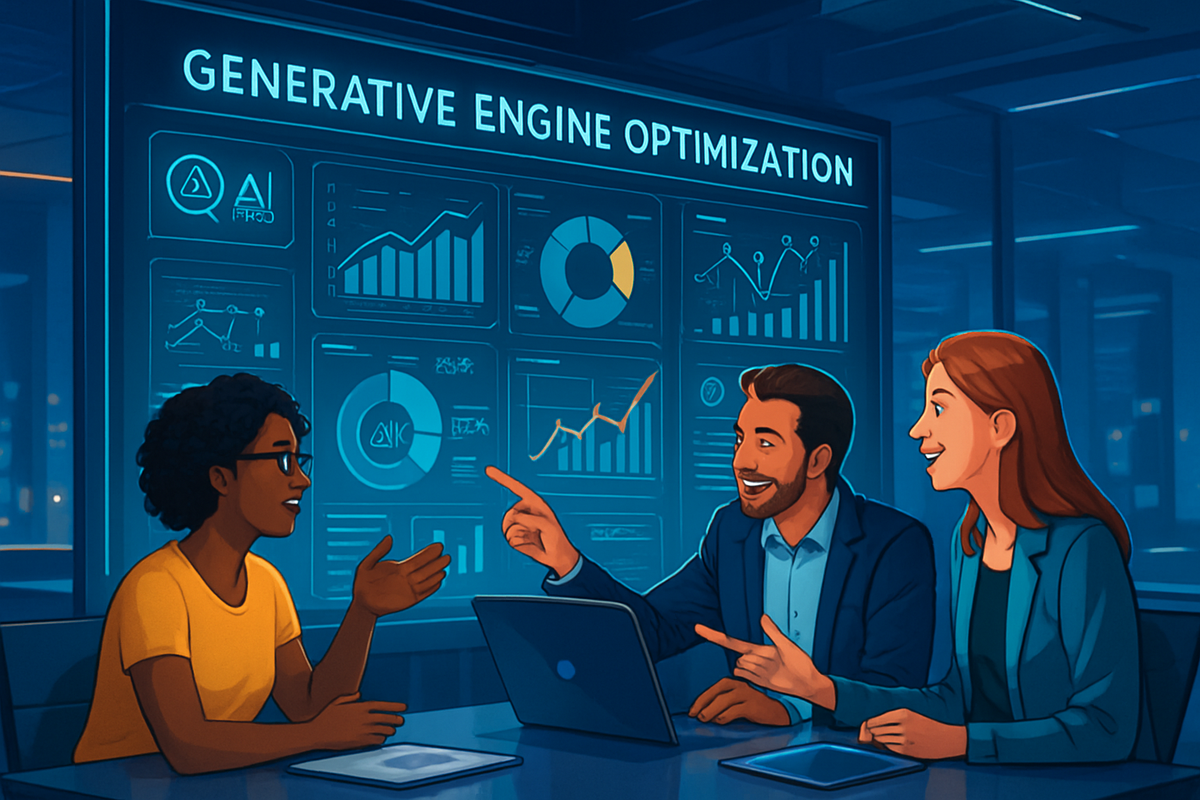How to Dominate Generative Engine Optimization (GEO) in 2026: Winning Strategies for Ranking in AI-Powered Search
Unlock the new digital frontier with GEO: dominate AI-driven search and teach machines to talk about you. Discover step-by-step strategies for 2026, gain AI citations, and future-proof your brand in the evolving landscape of generative engine optimization.

Welcome to the GEO Frontier: How to Win in AI-Driven Search
Generative Engine Optimization (GEO) isn’t just SEO’s cooler, smarter cousin—it’s the new sheriff in town. If you want your brand, content, or product to show up in answers from ChatGPT, Gemini, Perplexity, Claude, and the next generation of AI engines, you’ll need to rethink everything you know about ranking. This guide is your passport to GEO mastery in 2026—packed with step-by-step strategies, real-world wins, and the toolkit you need to ride the AI search wave (without getting wiped out).
"In generative search, you don’t just optimize for bots—you teach the machines how to talk about you."
Why GEO Matters: The Great Search Shift
By 2026, AI-powered answer engines are eating traditional SEO’s lunch. People aren’t just googling; they’re asking (and trusting) AI chatbots, voice assistants, and LLM-powered platforms for recommendations, summaries, and decisions. If your brand isn’t appearing in these answers, you’re invisible to a fast-growing chunk of your market.
- AI search is already reducing website clicks by 30–60%. (Source: Mike Khorev, 2025)
- Generative engines now influence B2B and B2C buying journeys as much as Google.
- GEO is the new competitive edge. Early adopters are seeing 3–5x more AI citations and referral traffic.
GEO vs. SEO: What’s Actually Different?
- GEO: Optimizes for how AI engines synthesize, summarize, and present your content in answers, not just how they index it.
- SEO: Optimizes for how search engines rank your pages in lists of blue links.
Think of GEO as teaching the next generation of digital librarians—who happen to be robots with excellent memory but no life experience—how to quote you correctly, contextually, and often.
The GEO Toolkit: Tactics to Win in AI-Powered Search
1. Prompt Engineering for Content
AI engines don’t just crawl—they converse. They pull from sources that answer questions clearly, concisely, and contextually. To become their go-to source:
- Structure your content as answers to real questions. Use FAQ blocks, how-to steps, and conversational headings.
- Anticipate the prompts people use. Think: "What’s the best X for Y?" or "How do I Z?"—then answer those directly in your content.
- Test your own site in ChatGPT, Gemini, and Perplexity. If your brand isn’t cited or summarized accurately, tweak your language and data.
2. Structured Data & Semantic Markup
AI loves structure. Help LLMs understand your content by using:
- Schema.org markup for products, reviews, people, organizations, and FAQs.
- Clear, unambiguous language. Use full names, roles, and relationships ("Jane Doe, CEO of WidgetCo, said...").
- Tables, lists, and bullet points. Make your facts and stats easy to extract.
3. Answer Engine Optimization (AEO)
GEO overlaps with Answer Engine Optimization (AEO), which means:
- Directly answering popular questions in your niche. (Use tools like Semrush, Surfer SEO, MarketMuse for question research.)
- Formatting for "featured answers" and AI snippets. Short, fact-rich paragraphs win.
- Optimizing for voice and conversational queries. Think natural language, not keyword-stuffed robot talk.
4. Digital Reputation & Authority Management
LLMs weigh brand authority, reputation, and trust more than ever:
- Claim and optimize knowledge panels (Google, Bing, LinkedIn, Crunchbase, etc.).
- Encourage third-party reviews, press mentions, and citations. LLMs cross-check sources—be everywhere!
- Monitor and correct misinformation. If AI bots get facts about you wrong, update your content and request corrections on high-authority platforms.
5. Future-Proofing Content for LLM Discovery
Stay ahead of algorithmic and conversational changes:
- Regularly update evergreen content. LLMs love freshness and accuracy.
- Use unique insights, data, and proprietary research. AI engines reward originality over recycled web fluff.
- Build topic clusters and semantic relationships. Interlink related articles so bots see you as an authority hub.
Step-by-Step: GEO in Action (A Playbook for 2026)
- Identify Key Questions & Prompts your audience asks AI engines. (Use Perplexity, AlsoAsked, and your own product’s support logs.)
- Craft Answer-First Content that directly addresses those prompts. Lead with the answer, then explain.
- Mark Up with Schema—especially FAQs, products, and reviews. Validate with Google’s Rich Results Test.
- Test in Generative Engines: Ask ChatGPT, Gemini, and Claude your target questions. Is your site cited or summarized? If not, refine!
- Amplify Authority by earning mentions, reviews, and citations across top third-party sites. (Think: industry blogs, news, directories.)
- Monitor & Adapt: Use AI search visibility tools (like Semrush’s AI Visibility, Surfer SEO’s AI SERP Analyzer) to track your citations and rankings in real time.
Real-World GEO Success Stories
- Case: Multilingual Hospital SEO – By optimizing for both traditional and AI-powered search (using AI-specific FAQs and schema), MedPark Hospital tripled organic traffic and attracted 250k+ monthly visits to its English site via AI engine citations. (Source: AInvest, 2025)
- Case: B2B SaaS Brand – After reformatting blog content into Q&A and updating schema, a SaaS firm saw a 40% increase in AI-generated answer citations, directly boosting demo signups.
"Sites using AI-optimized content grew 5% faster than those relying on traditional methods. The sweet spot: human insight + AI-tailored structure."
— Mike Khorev, SEO Consultant
The 2026 GEO Power Toolkit
- AI SERP & Visibility Trackers: Semrush AI Visibility, Surfer SEO AI Analyzer, Perplexity Rank Checker
- Content Optimization Suites: MarketMuse, Jasper AI, Contently GEO, Clearscope
- Schema & Structured Data Tools: Merkle Schema Markup Generator, Google’s Rich Results Test
- Reputation Management: Brand24, Mention, Google Alerts (for citations and misinformation monitoring)
- Prompt Testing Platforms: Perplexity, ChatGPT, Gemini (test how your content is cited or summarized)
Stay Ahead: GEO Best Practices for 2026 & Beyond
- Balance human creativity with AI optimization. The magic formula? 70% human insight, 30% AI-driven structure and research.
- Diversify your digital footprint—be visible on Google, Bing, Perplexity, ChatGPT, Gemini, and wherever your audience asks questions.
- Invest in continuous learning. GEO is shifting fast—subscribe to smart news (like ours!) for the latest strategies, AI search updates, and case studies.
Want to comment or join the conversation? Only Funaix Insiders can post and read blog comments! Subscribe for free (for now) and unlock exclusive insights, tools, and community perks. Stay ahead, stay smart.
Conclusion: GEO Is the New Growth Hack—Don’t Get Left Behind
GEO is not just a trend; it’s the new foundation for digital visibility. As AI-driven search becomes the norm, those who master GEO will own the conversation, the clicks, and the trust of tomorrow’s customers. Don’t just optimize—teach the machines to make you famous.
Ready to future-proof your growth? Subscribe now for free, join the Funaix Insider community, and get all the GEO, AI, and smart marketing news you can handle—delivered with wit, wisdom, and a wink.




